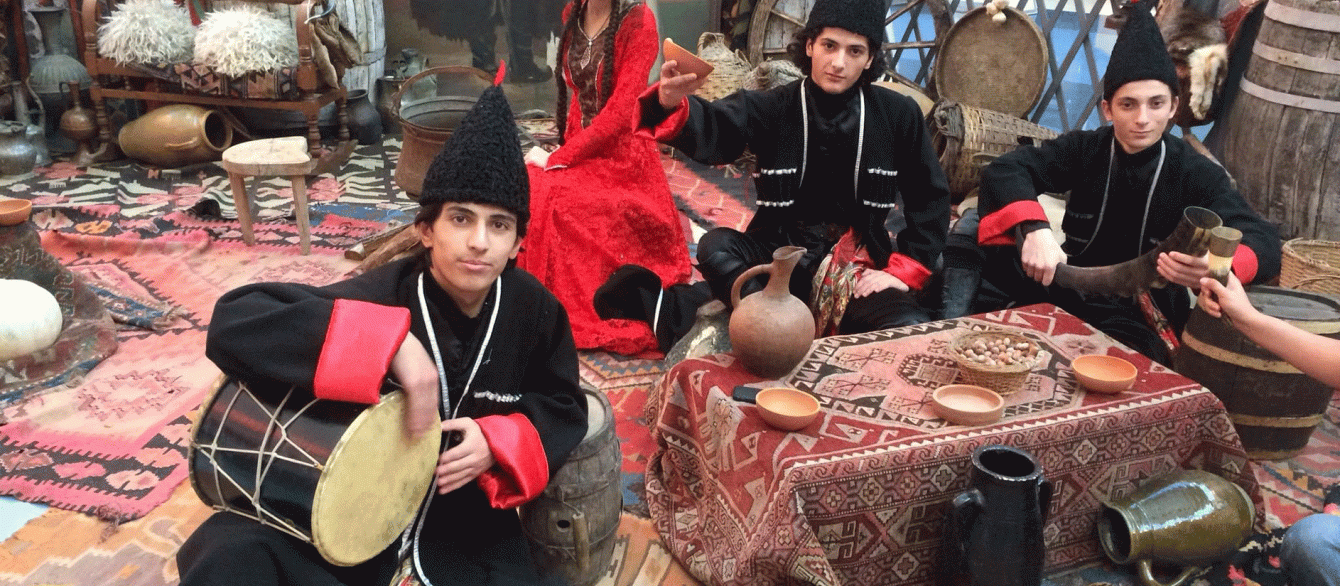Musicologist Nana Sharikadze's talk kicks off this year's Exchanging Notes program, which will culminate in a collaborative, inter-cultural performance of drumming and dancing on Saturday, Sept. 21, in Somerville. After giving a brief introduction to the richness of Georgian culture, Dr. Sharikadze will lead a discussion with Exchanging Notes artists Claire Lane, Lasha Mdzinarashvili, George Oniani, and Marcus Santos. A reception with Georgian food and wine will follow, where guest will have a chance to converse directly with all five speakers.
Georgian culture stands as a vibrant testament to the confluence of diverse influences throughout history. At the crossroads of East and West from ancient times to the present, Georgia has become a unique cultural mosaic of pre-Christian and Christian traditions, influences of neighboring empires, and modern global trends. Tbilisi, its capital, has historically attracted diverse groups, melding the cultures of Georgians, Armenians, Jews, Arabs, Persians, Ottomans, Europeans, Russians.
By tracing the historical and contemporary impacts of these cultural exchanges, we gain insight into the identity markers of a Georgian cultural "we." Deeply rooted in the preservation of homeland, language, and faith, Georgian cultural identity has been sculpted by a history of resilience against invaders. Dance and music (particularly traditional and urban forms) have played a pivotal role in expressing and preserving this identity. These art forms have served as mediums through which Georgians have articulated their sense of self, awareness of belonging, and differentiation from others.
Georgian music, characterized by its complex polyphony and deep ties to both sacred and secular traditions, has been a critical element in maintaining cultural heritage, especially in the face of external political and cultural pressures, including those from the Russian Empire, the co-religionist “big brother.” Dr. Sharikadze's talk, however, will also show how Georgian culture has absorbed, adapted, and redefined various influences to forge a unique identity.
Urban music, particularly in Tbilisi, further illustrates this cultural crossroads. The 19th century saw the development of a Georgian musical style that sought to revive and integrate traditional music with European classical influences, reflecting a national self-determination movement.
Georgian music and dance serve as a testament to the country's unique ability to blend diverse cultural influences, creating a distinctive cultural expression that resonates with both historical and contemporary relevance. By showcasing performances that blend such influences, we illustrate how Georgian culture has continuously evolved, dynamically reflecting a fusion of global styles while maintaining its distinctive character. This is not only a hallmark of Georgian identity but also a powerful example of how cultures can create new and vibrant forms of artistic expression while balancing preservation with development and modernism.
Sponsorship
This event is co-sponsored by the Somerville Arts Council.
The Program on Georgian Studies is an activity of the Davis Center for Russian and Eurasian Studies at Harvard University and is made possible by a sponsored research award from the Ministry of Education and Science of Georgia.
Accessibility
The Davis Center for Russian and Eurasian Studies at Harvard University encourages persons with disabilities to participate in its programs and activities. If you anticipate needing any type of accommodation or have questions about the physical access provided, please contact us at 617-495-4037 or daviscenter@fas.harvard.edu in advance of your participation or visit. Requests for Sign Language interpreters and/or CART providers should be made at least two weeks in advance if possible. Please note that the Davis Center will make every effort to secure services but that services are subject to availability.




